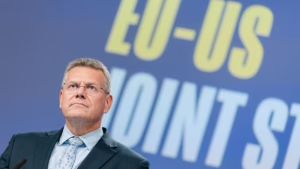A highly advanced technology, which holds much potential for medical breakthroughs in the treatment of various cancers and infectious diseases, is facing neglect within the Trump administration. Scientific communities are growing concerned that Trump-appointed health officials, influenced by misinformation and conspiracy theories surrounding the Covid-19 vaccine, are poised to cut funding for critical research in this field, particularly with respect to mRNA technology.
Scientists and health experts, who prefer to remain anonymous due to fear of backlash, have reported that the National Institutes of Health (NIH) is taking steps to gather information on the funding of mRNA vaccine research. There is a worry that this could be a precursor to defunding grants associated with this technology, which was instrumental in the rapid development of Covid-19 vaccines.
mRNA technology, which in the context of Covid-19, instructs the body to combat infection by introducing immune cells to the coronavirus’s characteristic spike proteins, is being investigated for its potential application against a wide range of diseases, from avian flu and dengue fever to pancreatic cancer and melanoma.
Although the NIH has not officially confirmed any cuts to mRNA vaccine and therapy research, scientists have been privately informed that the organization is conducting keyword searches on grants that refer to mRNA vaccine-related technology and associated phrases. There is an unspoken advice circulating not to apply for these grants, according to sources.
The NIH’s data collection was confirmed as a “data call” organized by acting NIH director Matthew Memoli on March 6, resulting in information on approximately 130 mRNA grants being amassed. This move, along with the administration’s consideration to review a nearly $600 million contract between the Department of Health and Human Services (HHS) and Moderna for mRNA research on flu vaccines, is intensifying fears among the scientific community.
Concerns are exacerbated by the public stance of figures within the administration, such as Robert F. Kennedy Jr., the newly confirmed head of HHS, who previously held anti-vaccine views. The situation is further complicated by the nomination of individuals who have questioned the severity of the Covid-19 pandemic for key positions within the NIH and FDA.
Health experts argue that the situation is closely tied to the politicization of the pandemic and misinformation regarding Covid-19 vaccines. Prior to the pandemic, even anti-vaccine groups did not focus on mRNA vaccines, indicating a shift in opposition to include any technology linked to Covid-19 response.
Nicholas Offit, a vaccine education expert, noted that while researchers are still eligible to receive grants, a war against mRNA technology is developing, with unclear motives.
The FDA’s role in regulating mRNA drugs and therapies remains critical. Despite fears of political interference, some experts remain hopeful that current FDA officials will continue to base approval decisions on scientific evidence.
The industry, represented by companies like Pfizer, Moderna, and the drug lobby group PhRMA, shows concern regarding the possible ramifications of the Trump administration’s stance on mRNA vaccines for ongoing research and development.
Scientists remain vigilant and apprehensive about potential developments, calling it “economic madness” and a potential threat to the powerful technology’s potential against future pandemics. Should you have relevant information, please contact Stephanie.Kirchgaessner@theguardian.com or on Signal at 646-886-8761.
Source: https://www.theguardian.com/us-news/2025/mar/27/trump-vaccine-skeptics-research-funding








